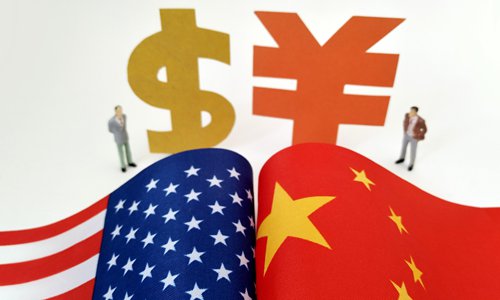HOME >> OPINION
China, US should work out square deal
Source:Global Times Published: 2019/6/20 22:43:40

Photo: IC
China and the US are apparently moving to restart trade negotiations. What achievements can be made during the meeting between their leaders at the G20 summit in Japan next week? Will high-level talks resume and reach a final deal? The answers depend on whether both sides, especially the US, have the goodwill to reach a fair agreement through equal negotiations.
Beijing and Washington hold different opinions on what a fair deal is based on their own interests. But they can still find a clue on how to bridge mutual understanding.
First, the interests of both sides should be reciprocal, which means the deal should not be winner-takes-all. The deal must be a win-win agreement so that one party cannot exploit its interests at the cost of the other.
Second, the two sides should share equal costs. Third, the terms of the deal should be on an equal footing. The statement should not be like one party is exerting pressure and the other is forced to accept the conditions. Such a deal will not help China and the US set up long-term cooperation based on equality.
The two countries need to make efforts if they want to reach a deal. They should enhance strategic communication and try their best to ease strategic mistrust of the other side. The way that the US launched the trade war against China and its extreme measures such as the abrupt crackdown on Chinese enterprises including Huawei, plus its technological decoupling with China, have all left the impression on Chinese society that the US is not simply engaged in a trade war with China but is actually launching all-out containment with Cold War characteristics.
The US, on the other hand, delivers a great deal of propaganda about China stealing US technology and seeking to replace US hegemony. The two sides should conduct in-depth communication over fundamental issues embedded in bilateral relations, which will lay the political foundation for reaching a deal. The US is imposing maximum pressure on China, making the Chinese people believe that once China compromises, there will be no end to it. More and more Chinese support a tough response to the US and reshaping US understanding of China through a long-lasting and consuming confrontation.
Both China and the US are countries with strength and are capable of bearing a trade war. But they will lose the market of the other side and suffer losses. As products from other countries will have better access to the Chinese and US markets, the global industrial chain will face a major readjustment.
From a long-term perspective, China and the US will not persist with confrontational trade policies. China's stance has been consistent: It does not want a trade war, but it is not afraid of one and it will fight one if necessary. It is hoped that after twists and turns in the past more than one year, the US can have an objective and complete understanding of China's stance.
China does not want the trade war to become the norm in China-US relations and hopes to end it as soon as possible so that bilateral ties can be back on the right track. Meanwhile, given the unstable US attitude, China is prepared for any worse-case scenarios.
Posted in: EDITORIAL